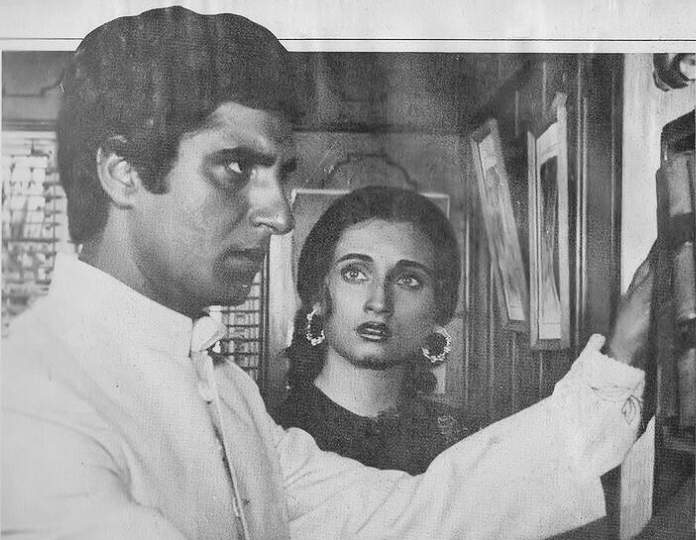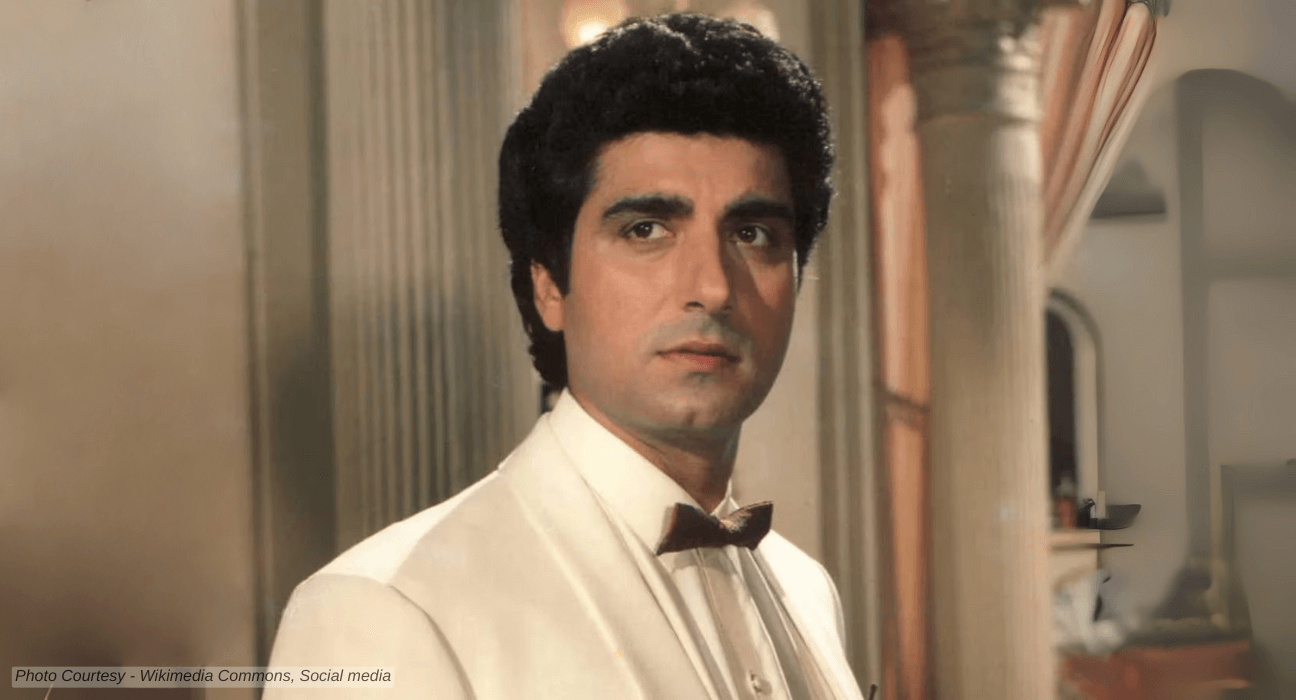Raj Babbar is one of those rare actors who truly blurred the boundaries between a hero and a villain; he played both at the same time. Be it a cruel rapist of “Insaf Ka Tarazu,” a soft-hearted poet of Nikaah and Prem Geet, the vigilante of “Aaj Ki Awaaz,” or the evil mastermind of “Aitbaar.”
Early Life
Raj Babbar, born on June 23, 1952, in Agra, Uttar Pradesh, into a Punjabi family, originally belongs to Jalalpur Jattan, which is now in Pakistan. He completed his early education at Mufid-E-Aam Inter College, Agra, before graduating from Agra College. His love for performing arts took him to the National School of Drama (NSD) in Delhi, where he graduated in 1975.
Raj Babbar In Films

Raj started his career in films with a supporting role in the controversial film “Kissa Kursi Ka” in 1977. He did not get any substantial role until 1980, when he was cast in an array of films ranging from family drama “Sau Din Saas Ke (1980),” opposite Reena Roy.
His next big success came with musical drama “Aap To Aise Na The,” with Deepak Parshar and Ranjeeta. The film was remembered for its iconic songs like “Tu Is Tarah Se Meri Zindagi,” and the acting of Babbar. He the starred in multistarrer “Hum Panch,” and blockbuster Punjabi film “Chan Pardesi.”
The Bad Boy Who Was Loved By All
However, it was his role as a rapist in B.R. Chopra’s “Insaf Ka Tarazu” that brought him notoriety and established him as a formidable actor in the industry. In the film, Raj Babbar’s character, Ramesh Gupta, is depicted as a cruel businessman. Gupta commits heinous crimesagainst Bharti Saxena, played by Zeenat Aman, and later her sister, portrayed by Padmini Kolhapure. The film’s depiction of these events and the courtroom drama that ensued sparked widespread public discourse on the portrayal of justice, women’s rights, and the legal system’s handling of such delicate matters.
But what is curious is Raj Babbar’s fan following among girls and the fan mail he received after the film. The film, which portrayed him as a monster and a hate figure, got unprecedented love from the viewers.
Raj Babbar then went on to do many path-breaking films and never shy away from experimenting with different genres. In 1981, Shyam Benegal gave him the role of Dharam Raj (Yudhishther) in his film “Kalyug,” which was a modern-day adaptation of Mahabharat. The same year came one of his most important films of his career “Prem Geet.” In the film he played a poet who is in love with a terminally ill girl played by Anita Raj. The song “Hoton Se Chhu Lo Tum” has since become the trademark song of Raj Babbar.
The Actor with a Difference
The same year, he acted in Muzaffar Ali’s epic “Umrao Jaan” as Daku Faiz Ali to great critical acclaim. B. R. Chopra again gave him a role of a lifetime when he cast him in Nikaah. In the 1982 blockbuster he played a poet, Afaque Haider, opposite Salma Agha. Although it was a supporting role, he stole the show with his sincere and almost innocent portrayal.
He again played a character with negative shades in “Arpan (1983),” with Jeetendra and Reena Roy. Babbar also played a jeoulous husband in “Agar Tum Na Hote,” with Rajesh Khanna and Rekha. He then starred in Ravi Chopra’s “Mazdoor (1983),” with Dilip Kumar, Nanda, and Padmini Kolhapure. He association with Chopra continue with “Aaj Ki Awaaz (1984).” In the film he played a vigilante who was avenging the wrongdoings committed against his family and society. In 1985, he was cast in “Aitabar,” Mukul Anand’s adaptation of Alfred Hitchcock’s 1954 thriller Dial M for Murder.
Some other notable films of Raj Babbar include Armaan (1981), Aapas Ki Baat (1981), Dulha Bikta Hai (1982), Bheegi Palkein (1982), Jeevan Dhaara (1982), Gehri Chot (1983), Rang Birangi (1983), Naukar Biwi Ka (1983), Jeene Nahi Doonga (1984), Kanoon Meri Mutthi Mein (1984), Shapath (1984), Jhoothi (1985), Ek Chitthi Pyar Bhari (1985), Meraa Ghar Mere Bachche (1985), Salma (1985), Ulta Seedha (1985), Dahleez (1986), Kirayadar (1986), Baat Ban Jaye (1986), Suhagan (1986), Awam (1987), Mirch Masala (1987), Muqaddar Ka Faisla (1987), Sansar (1987), Vijay (1988), Waaris (1988), Libaas (1988), Zakhmi Aurat (1988), Andha Yudh (1988), Suryaa: An Awakening (1989), and many more.
Iconic Charactor Actor
In 1990, he started doing character roles in films like “Ghayal,” where he played the role of Sunny Deol’s older brother. Some of his notable films from the 1990s include Dharam Sankat (1991), Karm Yodha (1992), Kal Ki Awaz (1992), Rudaali (1993), Maya Memsab (1993), and a few more.
In the 1990s, he also acted as a full-fledged villain in films like “Saazish (1988), “Aankhen (1993),” “Dalaal (1993),” “The Gambler (1995),” “Andaz (1994),” “Yaarana (1995),” “Barsaat (1995),” “Ziddi (1997),” “Daag the Fire(1999), Indian (2001),” and many more. Yarana and Dalaal bagged him Filmfare nominations for Best Villain.


He also worked in many punjabi films such as Aasra Pyar Da (1983), Long Da Lishkara (1986), Marhi Da Deeva (1989), Qurbani Jatt Di (1990), Naseebo (1994), Ucha Pind (1994), Shaheed Uddham Singh (1999), Mahaul Theek Hai (1999), Yaaran Naal Baharran (2005), Ek Jind Ek Jaan (2006), Tera Mera Ki Rishta (2009), Apni Boli Apna Des (2009), Khiladi 786 (2012), and Bhoot Uncle Tusi Great Ho (2022).
Raj Babbar also worked in TV shows like Bahadur Shah Zafar (1986), Mahabharat (1988), Maharaja Ranjit Singh (2010), Pukaar-Call For The Hero (2014), Dil Bekaraar (2021), and Happy Family: Conditions Apply (2023).
Personal Life
His personal life has seen its share of light and tragedy. Babbar was married to theatre personality Nadira Babbar, with whom he has two children, Arya and Juhi Babbar.
In the 1980s, he worked with legendary actress Smita Patil, and both fell in love. Raj and Smita married in 1983, and together they had a son, Prateik Babbar. Smita died on December 13, 1986, 15 days after the birth of her son Pratiek, from childbirth complications.
Raj Babbar on IMDB













Leave feedback about this